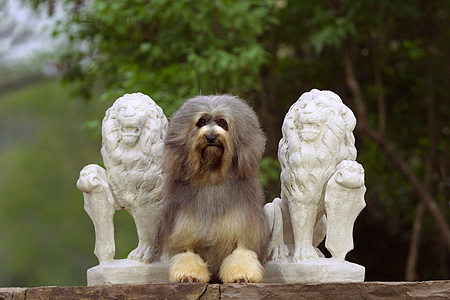
The earliest recorded name of the Löwchen is the Maltese Lion Dog, a name it kept until the French naturalist, Georges-Louis Leclerc, the Comte de Buffon, renamed it Bichon Petit Chien Lion, or Little Lion Dog. Since then, the French have claimed their own country as its place of origin. The fact that its other names are Schoshundle, Gutchen Hund, and Löwchen (baby lion in German), however, hints otherwise.
Let the games begin. Some insist of the breed’s German origin, others maintain that Belgium, Holland, the Mediterranean, or, yes, France, is where the breed originated. Before anyone scoffs at the notion of Mediterranean roots, proponents of that theory claim that the Löwchen is a member of the Bichon family, the name “Bichon” translated from French as “lap dog with silky hair.”
The debate will be unlikely to be settled to anyone’s satisfaction without irrefutable proof. There again, there is room for debate: Some believe that the dog in painting created by Jan van Eyck in 1434, “The Arnolfini Marriage,” is a Löwchen, others (read: Brussels Griffon fanciers) say, “not so fast,” it’s our breed.

Ready for one more wrangle?
Legend says that if a knight died a less than valiant death, or died peacefully of natural causes, a Löwchen was carved at the foot of his tomb. If the knight died in battle, he would have a lion carved at his feet. Try as we might, we were unable to find a knight’s tomb with a Löwchen carved anywhere on it. We were, however, able to find tombs with lions, including the one below belonging to Jean D’Alluye, a French Crusader. Some say that there are several gisants, or sepulchral sculptures of dogs like this one there, but none that resembled a Löwchen.

Experts on the subject say that one is more likely to find dogs like a Löwchen at the feet of a lady’s tomb, not a knight’s final resting place. Shoulder shrug. The results of our own cursory investigation, then, suggest that either the legend is wrong, or that no knight ever died of natural causes or a less than honorable death on a battlefield.
Image found on Pinterest and happily credited upon receipt of information
